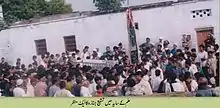Syed Ali Akhtar Rizvi
Syed Ali Akhtar Rizvi (19 September 1948 – 10 February 2002), widely known as Adeeb-e-Asr and Allamah Shaoor, was an Indian Twelver Shī'ah scholar, public speaker, translator, and historian as well as an author and poet. He authored and translated many Islamic books and also wrote many articles and poems.
Syed Ali Akhtar Rizvi | |
|---|---|
 | |
| Born | 19 September 1948 Gopalpur, Siwan District, Bihar, India |
| Died | 10 February 2002 (aged 53) |
| Pen name | Shaoor |
| Occupation | Islamic scholar |
| Notable works | Urdu Translation Volume Book Of Al-Ghadir |
| Website | |
| shaoorewilayat | |
He received the title Adeeb-e-Asr, "Writer of the era") from Grand Ayatollah Naser Makarem Shirazi during the tour of Iran in 1990.
Biography
Early life and education
Syed Ali Akhtar Rizvi was born at Gopalpur, Siwan district, Bihar state, India on 19 September 1948. His father was Syed Mazhar Hussain Rizvi. At the age of three, his father died and he was brought up by his mother. It was his mother's ambitions that lead him towards Islamic studies so he joined Jamia Nazmia and stayed in Madrasatul Waizeen. But due to financial problems he moved to Lucknow Shia Orphanage to fulfil his ambition to become an Islamic scholar. As soon as financial conditions improved he moved to Madrasatul Waizeen.
He returned home after completing his last exam Mumtaz-ul-Afazil at Jamia Nazmia.
Death and funeral

Syed Ali Akhtar Rizvi died on 10 February 2002. His funeral was attended by many scholars and preachers and was followed by huge crowd at Gopalpur, Siwan district, Bihar.
| Part of a series on Shia Islam |
| Twelvers |
|---|
|
|
Family
Syed Ali Akhtar Rizvi had six sons and one daughter. His second eldest son Syed Shahid Jamal Rizvi lives in Qom, Iran. He followed his father's footstep and has written many Islamic articles, He has also translated two volumes of book Al-Ghadir. His daughter is married to the poet, writer and nauhakhawn Syed Irfan Abbas Rizvi, popularly known as Irfan Nasirabadi.
Title and pseudonym
Syed Ali Akhtar Rizvi was awarded many popular titles, like Adeeb-e-Asr (Urdu: ادیب عصر), Mutarajjim Al-Ghadir (Urdu: مترجم الغدیر ), Allamah (Urdu: علامہ). He received the title Adeeb-e-Asr (Urdu: ادیب عصر, "Writer of the era") from Grand Ayatollah Naser Makarem Shirazi during the tour of Iran in year 1990.
He adopted the pen-name of Shaoor (Urdu: شعور, "Wisdom, Decency").
Bibliography
As translator
- Ghadeer Volume 1. 1991. ISBN 978-600-6088-08-2.[1][2]
- Ghadeer Volume 2 & 3. 2010. ISBN 978-600-91931-5-8.[3][4]
- Ghadeer Volume 4 & 5. 2010. ISBN 978-600-6088-08-2.[5][6]
- Ghadeer Volume 6. 2010. ISBN 978-600-91931-6-5.[5][7]
- Ghadeer Volume 7,8 & 9. 2010. ISBN 978-600-91931-9-6.[8][9]
- Ghadeer Volume 10 & 11. 2010. ISBN 9786006088099.[10][11]
- Tareekh-e-Islam me Ayesha ka kirdaar(Volume 1,2 & 3). Ansariyan Publications. 2008. ISBN 964-438-643-4.[12][13]
- Masa'eb-e-Aale Muhammad(pbuh). The World center for Shitte studies. 2007. ISBN 978-964-94976-0-0.[14]
- Al-Hayat(2 vol.).
- Shahr-E-Shahadat. Lucknow: Majlis-e-Ulma Wa'ezeen. 1999.
- Imam Mehdi(A.S) Hadees Ki Roshni Me. Lucknow: Majlis-e-Ulma Wa'ezeen. 1999.
- Resala Amaliya Imam Khomaini(2 vol.).
- Mayyat pe Girya. 2002.
- Khushboo Bahar Ki.
- Masaji-O-Imambara.
- Khanwada-e-Shairazi Biswi Sadi me.
As author
- Ghadeer ke Char Alamti Shayer. 2010.[15]
- Shaoor-e-Shahadat. Shaoore Wilayat Foundation. 2012.
- Tohfe ka meyar Tahzeeb.
- Shaoor-e-Wilayat.
- Shaoor-e-Khetabat.
- Anwaar-e-Shaoor.
- Hayat Ayatullah-ul-uzma Shirazi.
As poet
- Abshaaro Ka Tarannum. Shaoore Wilayat Foundation. 2013.
- Mauj Dar Mauj. Shaoore Wilayat Foundation. 2013.
- Mauj-e-Tabassum. Shaoore Wilayat Foundation. 2013.
- Kulliyat-e-Sha'oor.
Articles
His articles was greatly influenced by Islamic Literature and enlighten many historic facts of Islam. His articles mainly laid emphasis on Qur'an, wilayat, tragedy of Karbala, and usool-e-deen. Some of his articles are listed below:
- wilayet-e-Ali(a.s) Qur'an ki raushni me
- Kalma-e-Innama Qur'an Ki Raushn Me
- Eid-e-Ghadir
- wilayat-e-Ali(a.s) ki Ma'wun Ahadees
- Ghadir aur Qur'an
- Ghadeer: Daaman ki Dhajjiyan
- Wilayat ke dunyawi wa Aakhari fawayed per Ajmali Nazar
- Eid per Sahaba ki hasdana nazar
- Ahmiyat Ghadir: Masumeen(a.s) ki nazar me
- Shuja'at Hazrat Zahra(s.a)
- Imam Hussain(a.s) paikar-e-Muhabbat
- Imam Hussain(a.s) per Girya
- Zikr-e-Khuda aur Karbala
- Aadi Tariqa shahadat kyu
- Ghulamo ke Hukhuq aur Karbala
- Ek maqbool Nauha
- janabe Qasim(a.s) ki Shahadat
Beside Islamic article, he had also written articles on Urdu Literature. This type of articles were related to different aspect of life and way of living it. The articles also describe the way of spreading Love, affection and generosity among mankind.
See also
- List of Shi'a Muslim scholars of Islam
- Shi'a clergy
- Al-Ghadir
- Moulana Syed Ali Rizvi Gopalpuri
References
- "Al-Ghadeer 1". Shaoorewilayat.com. Retrieved 23 February 2014.
- "Ghadeer - Quran, Hadees aur Adab may - 01 of 11". Scribd.com. 23 July 2013. Retrieved 23 February 2014.
- "Ghadeer-Quran,Hadees,Adab may - 02, 03 of 11". Scribd.com. Retrieved 23 February 2014.
- "Al-Ghadeer 2.3". Shaoorewilayat.com. Retrieved 23 February 2014.
- "Ghadeer - Quran, Hadees aur Adab may - 04, 05 of 11". Scribd.com. Retrieved 23 February 2014.
- "Al-Ghadeerr 4.5". Shaoorewilayat.com. Retrieved 23 February 2014.
- "Algadeer 6". Shaoorewilayat.com. Retrieved 23 February 2014.
- "Ghadeer - Quran, Hadees aur Adab may - 07, 08, 09 of 11". Scribd.com. Retrieved 23 February 2014.
- "Al-Ghadeer 7.8.9". Shaoorewilayat.com. Retrieved 23 February 2014.
- "Al-Ghadeer 10.11". Shaoorewilayat.com. Retrieved 23 February 2014.
- "Ghadeer - Quran, Hadees aur Adab may - 10, 11 of 11". Scribd.com. Retrieved 23 February 2014.
- "Aayesha ka Kirdar". Shaoorewilayat.com. Retrieved 23 February 2014.
- "Tareekh e Islam Main Ayesha Ka Kirdar Vol 1_2_3.pdf : Free Download & Streaming : Internet Archive" (PDF). Archive.org. 10 March 2001. Retrieved 23 February 2014.
- "Masaibeaalemohammadbook". Shaoorewilayat.com. Retrieved 23 February 2014.
- "Ghadikecharalamatishayer" (PDF). Shaoorewilayat.com. Retrieved 23 February 2014.